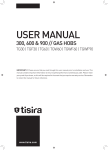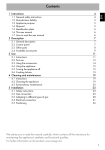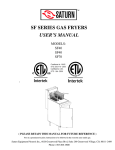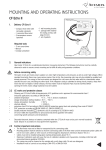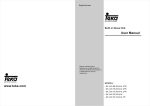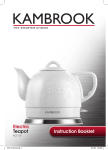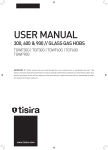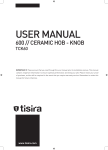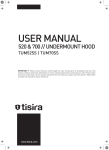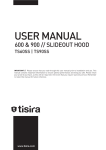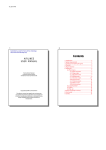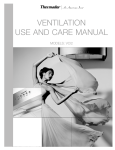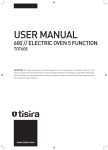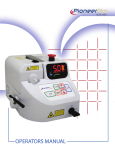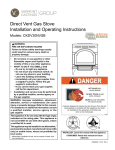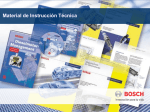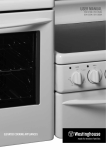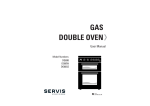Download Tisira Gas Hobs-User Manual
Transcript
User manual 600 & 900 // GAS HOBS TG60 | TGW60 | TGWF60 | TGWF90 IMPORTANT // Please ensure that you read through this user manual prior to installation and use. This manual contains important information to ensure optimal performance and keep you safe. Please retain your proof of purchase, as this will be required in the event that you require warranty service. Remember to retain this manual for future reference. tisira | www.tisira.com www.tisira.com pg 1 HELLO CONGRATULATIONS ON THE SELECTION OF THIS TISIRA APPLIANCE. TISIRA APPLIANCES HAVE BEEN SPECIFICALLY DESIGNED FOR AUSTRALIAN AND NEW ZEALAND KITCHENS. Please read through this user manual carefully as it contains information that will ensure that your appliance is installed correctly, important operating & care instructions and also some advice of what you need to do if this appliance is not performing as intended. pg 2 www.tisira.com | tisira CONTENTS HELLO2 CONTENTS3 WARNING & SAFETY INFORMATION 4 PRODUCT OVERVIEW 5 Installation6-11 Operating instructions 12-13 MAINTAINING YOUR COOKTOP 14 Product specifications 15 warranty terms & Conditions 16 PROOF OF PURCHASE 17 NOTES18-19 CONTACT DETAILS tisira | www.tisira.com 20 pg 3 WARNING & SAFETY INFORMATION This appliance is not intended for use by persons (including children) with reduced physical, sensory or mental capabilities, or lack of experience and knowledge, unless they have been given supervision or instruction concerning use of the appliance by a person responsible for their safety. Young children should be supervised to ensure that they do not play with the appliance. There shall be adequate ventilation of the room when the rangehood is used at the same time as appliances burning gas or other fuels. You must read the details concerning the method and frequency of cleaning. If the supply cord of this equipment is damaged, it must only be replaced by the manufacturer or its service agent or a similarly qualified person in order to avoid a hazard. This appliance has been designed for indoor domestic use only. Do not use or store flammable materials near this appliance. Do not spray aerosols in the vicinity of this appliance while it is in operation. Do not modify this appliance Where this appliance is installed in a marine craft or in caravans, it shall not be used as a space heater. pg 4 www.tisira.com | tisira PRODUCT OVERVIEW 2 2 2 2 1 1 3 4 7 7 2 2 4 6 5 1 3 7 Component Identification 1. Auxiliary Gas Burners 2. Semi-rapid burner 3. Rapid burner 4. Triple ring burner 5. Igniter for Gas Burners (only on certain models) 6. Safety Device – Flame Failure (only on certain models) activates if the flame accidentally goes out (spills, drafts, etc.), interrupting the delivery of gas to the burner. 7. Control Knobs for Gas Burners tisira | www.tisira.com pg 5 Installation 84 90 NOTICE // Must be installed by an authorized person in accordance with AS5601 (gas installations), local authority and any other statutory regulations. The following instructions are directed at the qualified installer so that the installation and maintenance procedures may be followed in the most professional and expert manner possible. IMPORTANT // Ensure appliance is disconnected from the electrical supply before performing any maintenance or regulation upkeep work. Gas inlet is located at the rear right OR left hand side depending on the model 25mm from the rear edge. Electrical terminal is located at the rear centre 50mm from the rear edge. Fixing brackets are provided which allow the hob the hob to be installed in 20-40mm benchtops. It is recommend to use all supplied brackets to ensure that the hob is secularly installed. Bracket Position 20mm top pg 6 Bracket Position 30mm top Bracket Position 40mm top www.tisira.com | tisira Installation Positioning for gas hob IMPORTANT // This unit may be installed and used only in permanently ventilated rooms in accordance with AS5601 (gas installations), local authority and any other statutory regulations. The following requirements must be observed: A The room must be fitted with a ventilation system which vents smoke and gases from combustion to the outside. This must be done by means of a hood or electric ventilator that turns on automatically each time the hood is operated. In a chimney stack or branched flue. (Exclusively for cooking appliances) Directly to the outside B The room must also allow for the influx of the air needed for proper combustion. The flow of air for combustion purposes must, not be less than 2m3/h per kW of installed capacity. The supply of said air can be affected by means of direct influx from the outside through a duct with a inner cross section of at least 100cm2 which must not be able to be accidentally blocked. Those appliances which are not fitted with a safety device to prevent the flame from accidentally going out must have a ventilation opening twice the size otherwise required, i.e. a minimum of 200 cm2 (Fig. A). Otherwise, the room can be vented indirectly through adjacent rooms fitted with ventilation ducts to the outside as described above, as long as the adjacent rooms are not shared areas, bedrooms or present the risk of fire (Fig. B). Adjacent Room | Room to be vented Detail A Examples of Ventilation Holes for comburant air - Fig. A Enlarging the Ventilation slots between the window and floor - Fig. B tisira | www.tisira.com pg 7 Installation C Intensive and prolonged use of the appliance may necessitate supplemental ventilation, e.g. opening a window or increasing the power of the air intake system (if present). D Liquefied petroleum gases are heavier than air and, as a result, settle downwards. Rooms in which LPG tanks are installed must be fitted with ventilation openings to the outside in order to allow the gas to escape in the event of a leak. Therefore, LPG tanks, whether empty or partially full, must not be installed or stored in rooms or spaces below ground level’ (cellars, etc.). It is also a good idea to keep only the tank currently being used in the room, making sure that it is not near sources of heat (ovens, fireplaces, stoves, etc.) that could raise the internal temperature of the tank above 50ºC. E Overhead clearances—(Measurement A) Rangehoods and exhaust fans shall be installed in accordance with the manufacturer’s relevant instructions. However, in no case shall the clearance between the highest part of the hob of the gas cooking appliance and a range hood be less than 600 mm or, for an overhead exhaust fan, 750 mm. Side clearances—(Measurements B, & C) Where B, measured from the periphery of the nearest burner to any vertical combustible surface, or vertical combustible surface covered with toughened glass or sheet metal, is less than 200 mm, the surface shall be protected to a height C of not less than 150 mm above the hob for the full dimension (width or depth) of the cooking surface area. Where the gas cooking appliance is fitted with a ‘splashback’, protection of the rear wall is not required. F In the event the cooktop is not installed above a built-in oven, a wood panel must be inserted as insulation. This panel must be placed at least 20 mm from the bottom of the cooktop itself. IMPORTANT // When installing the hob above a built-in oven, the oven should be placed on two wooden strips; in the case of a joining cabinet surface, remember to leave a space of at least 45 x 560 mm at the back. pg 8 www.tisira.com | tisira Installation When installing on a built-in oven without forced ventilation, ensure that there are air inlets and outlets for ventilating the interior of the cabinet adequately. Gas connection for gas hob The gas cooktop should be connected to the gas-supply by an authorised person only. During installation of this product it is essential to fit an approved gas tap to isolate the supply from the appliance for the convenience of any subsequent removal or servicing. Connection of the appliance to the gas mains or liquid gas must be carried out according to the prescribed regulation in force, and only after it is ascertained that it is adaptable to the type of gas to be used. If not, follow the instructions indicated in the paragraph headed “Adaptation to different gas types”. In the case of connection to liquid gas, by tank, use pressure regulators that conform to the regulation in force. IMPORTANT // For safety, for the correct regulation of gas use and long life of the appliance, ensure that the gas pressure conforms to the indications given in the Product Specification section of this manual under the heading “Nozzle and burner characteristics”. Connection to non-flexible tube Copper or Steel // Connection to the gas source must be done in such a way as to not create any stress points at any part of the appliance. The appliance is fitted with an adjustable, “L” shaped connector and a gasket for the attachment to the gas supply. Should this connector have to be turned, the gasket must be replaced (supplied with the appliance). The feeding connector of the gas to the appliance is threaded 1/2” gas male cylinder. Connection to flexible hose The gas feed connector to the appliance is a threaded, male 1/2” connector for round gas pipe. Only use pipes and sealing gaskets that that conform to the standards currently in force. Flexible hose must be certified to AS1869 class B or D 10mm in diameter and no longer than tisira | www.tisira.com pg 9 INSTALLATION 1200mm long. The hose must not be kinked or be able to touch any hot surface. The supply connection point must be accessible when installed. Checking the seal Once the appliance has been installed, make sure all the connections are properly sealed, using a soapy water solution. Never use a flame. Electrical Connection The cooktops fitted with a tripolar electrical supply cord are designed to be be used with alternating current according to the indications on the rating plate located under the cooktop. The earth wire can be identified by its yellow-green colour. In the case of installation over a built-in electric oven, the electrical connections for the cooktop and oven should be independent, not only for safety purposes, but also to facilitate removal of one or both in the future. Electrical Connection for Gas Cooktop The supply cord has been fitted with a 10A 3 pin plug. The power supply cord must be positioned so that it does not reach a temperature in excess of 50degC above room temperature at any point. Before actual connection make sure that: • The fuse and electrical system can withstand the load required by the appliance; • That the electrical supply system is equipped with an efficient earth hook-up according to the norms and regulations prescribed by law; • That the plug and switch are easily accessible after installation. Important // the wires in the mains lead are coloured in accordance with the following code: Green & Yellow - Earth Blue - Neutral Brown - Live As the colours of the wires in the mains lead may not correspond with the coloured markings identifying the terminals in your plug, proceed as follows: Connect the Green & Yellow wire to terminal marked “E” or coloured Green or Green & Yellow. Connect the Brown wire to the terminal marked “L” or coloured Red. Connect the Blue wire to the terminal marked “N” or coloured Black. pg 10 www.tisira.com | tisira INSTALLATION Gas Conversion – Natural Gas and ULPG The cooktop is factory fitted with Natural Gas Injectors. To adapt the cooktop to a different type of gas than that for which it was designed, (see the sticker under the hob or on the packaging), the burner nozzles must be changed, as follows: • Remove the pan supports and slide the burners out of the cooktop. • Unscrew the nozzles using a 7mm socket wrench and replace them with those for the new type of gas. (See the product specification “Burner and Nozzle Specifications”). • Reassemble the parts following the instructions in reverse order. • On completing the operation, replace the old rating label with the one showing the new type of gas; the sticker is available from our Service Centres. • If the gas pressure is different than that prescribed, a pressure regulator must be installed at the source, in compliance with national standards governing the use of piped gas regulators. Regulation of air supply to the burner The burners do not need any primary air regulator. Setting the minimum regulation NOTICE // In the case of liquid gas, the regulation screw must be fully screwed in (clockwise). • Turn the gas valve to minimum. • Remove the knob and turn the regulator screw (positioned either on the side of the top or inside the shaft - Fig. A and B) clockwise until the flame becomes small but regular. • Make sure that, when the knob is turned rapidly high to low, the flame does not go out. • In the event of a malfunction on appliances with the security device (thermocouple) when the gas supply is set at minimum, increase the minimum supply levels using the regulator screw in Fig. A- B. • Once the adjustment has been made, apply sealing wax, or a suitable substitute, to the old seals on the by-pass. tisira | www.tisira.com pg 11 Operating instructions The position of the corresponding gas burner is indicated on each control knob. Gas Burners The burners differ in size and power. Choose the most appropriate one for the diameter of the cookware being used. The burner can be regulated with the corresponding control knob by using one of tile following settings: 1 2 3 1. Off 2. High 3. Low To light a burner // simply press the corresponding knob all the way in and, then, turn it in the counter-clockwise direction to the High setting, keeping it pressed in until the burner lights. CAUTION // If the burner accidentally goes out, turn off the gas with the control knob and try to light it again after waiting at least 1 minute. To turn off a burner // turn the knob in the clockwise direction until it stops (it should be on the “off” setting). General Advice • For best performance, follow these general guidelines: • Use the appropriate cookware for each burner (see table) in order to prevent the flame from reaching the sides of the pot or pan; • Always use cookware with a flat bottom and keep the lid on; • When the contents come to a boil, turn the knob to “Low”. pg 12 www.tisira.com | tisira Operating instructions The position of the corresponding gas burner is indicated on each control knob. Gas Burners The burners differ in size and power. Choose the most appropriate one for the diameter of the cookware being used. The burner can be regulated with the corresponding control knob by using one of tile following settings: BURNER ø Cookware diameter (cm) RAPID 24 - 26 SEMI Rapid 16 - 20 10in-and, 14 then, turn it in the ToAuxiliary light a burner // simply press the corresponding knob all the way Triple ring wok 24in-until 26 the burner lights. counter-clockwise direction to the High setting, keeping it pressed Use cookware theburner diameter of which isgoes at least large as the so that alland of the CAUTION // If the accidentally out, as turn off the gascooking with thearea control knob try heat produced by the burner is used. to light it again after waiting at least 1 minute. To turn off a burner // turn the knob in the clockwise direction until it stops (it should be on the “off” setting). General Advice • For best performance, follow these general guidelines: • Use the appropriate cookware for each burner (see table) in order to prevent the flame from reaching the sides of the pot or pan; • Always use cookware with a flat bottom and keep the lid on; • When the contents come to a boil, turn the knob to “Low”. tisira | www.tisira.com pg 13 MAINTAINING YOUR COOKTOP General Maintenance Before cleaning or performing maintenance on your appliance, disconnect it from the electrical power supply. To extend the life of the cooktop, it is important that it be cleaned carefully and thoroughly on a frequent basis, keeping in mind the following: • The enameled, cast iron and stainless steel parts must be washed with warm water without using abrasive powders/cloths or corrosive substances which could ruin them. • The removable parts of the burners should be washed frequently with warm water and soap, making sure to remove caked-on substances. • On cooktops with automatic ignition, the end of the electronic ignition device must be cleaned carefully and frequently, making sure that the gas holes are not clogged. • Stainless steel can be stained if it remains in contact with highly calcareous water, aggressive detergents (containing phosphorous), acid food or chemicals for an extended period of time, it is recommended that these parts be rinsed thoroughly with water and then dried well, It is also a good idea to clean up any spills immediately before they damage the surface. Servicing Instructions Always refer servicing to an authorised service person. It is recommended that the appliance be serviced at least once per year to ensure the appliance continues to operate correctly and safety. Greasing the Gas Valves Over time, the gas valves may stick or become difficult to turn. If this is the case, they must be cleaned on the inside and the re greased. NOTICE // This procedure must be performed by an authorised service person. pg 14 www.tisira.com | tisira Product specifications Burners and Nozzle Specifications Burner Gas Type INJECTOR SIZE (mm) TPP (kpa) NGC (Mj/h) Small Natural 0.90 1.0 4.5 Medium Natural 1.10 1.0 6.0 Large Natural 1.40 1.0 10.5 Wok Natural 1.70 1.0 14 Small Propane 0.55 2.75 4.3 Medium Propane 0.70 2.75 6.0 Large Propane 0.90 2.75 10.5 Wok Propane 0.98 2.75 13.0 Total four burner 30.5 MJ/h (natural gas) and 29.05 (Propane Gas) Total five burner 41.0 MJ/h (natural gas) and 39.80 (Propane Gas) The appliance is supplied with a duplicate data plate, please attach to an adjacent surface for future reference. tisira | www.tisira.com pg 15 warranty terms & Conditions pg 16 www.tisira.com | tisira PROOF OF PURCHASE tisira | www.tisira.com pg 17 NOTES pg 18 www.tisira.com | tisira NOTES tisira | www.tisira.com pg 19 CONTACT DETAILS pg 20 www.tisira.com | tisira




















